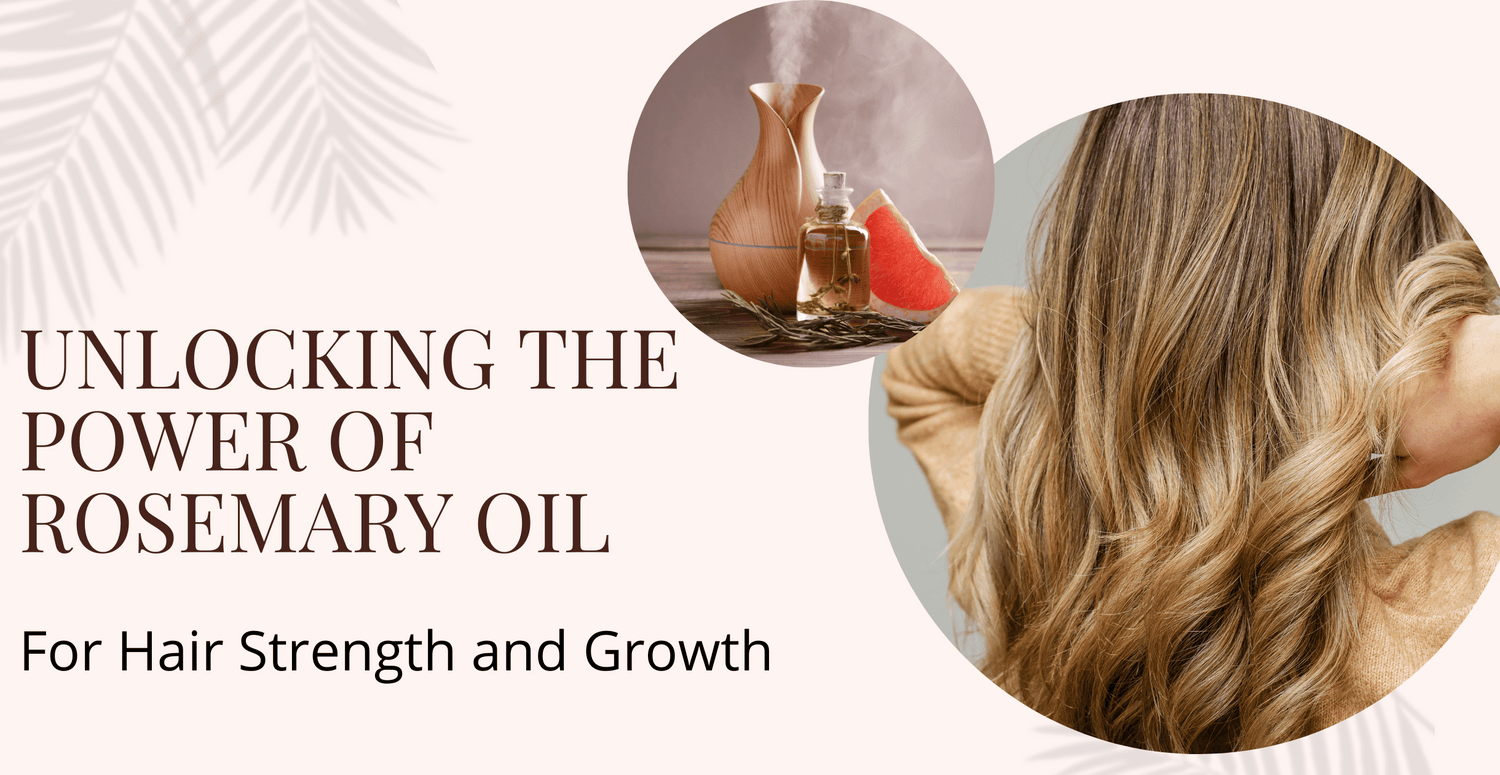Rosemary oil is a popular natural cure for promoting hair strength and growth. Although scientific study on its usefulness is limited, it is thought to provide various benefits for the hair and scalp. Choose the right rosemary oil, dilution, patch test, regular scalp massage, leave-in treatment, shampoo, and condition as usual, regular use, hair rinse, avoiding allergies and irritation, and a balanced diet and hair care are all ways to unlock the potential benefits of rosemary oil for your hair. While some people claim great effects from using rosemary oil for hair growth and strength, it's important to keep your expectations in check. The results can vary from person to person, and scientific proof to back up these assertions is currently scarce. If you have specific hair difficulties, it's always a good idea to get personalised advice and treatment alternatives from a dermatologist or healthcare professional.
The Hair Benefits of Rosemary Oil
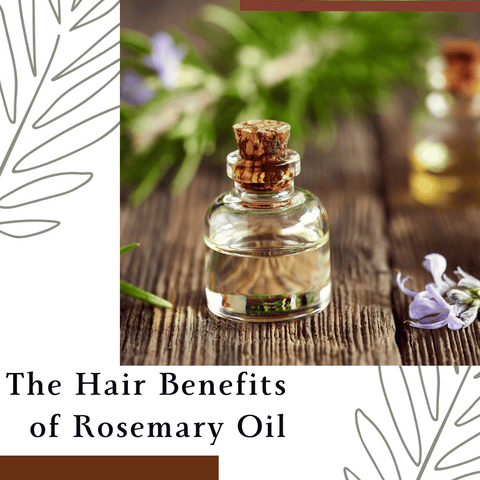
Rosemary oil is said to have a number of possible hair advantages, but scientific evidence to support these claims is sparse. Some of the purported hair advantages of rosemary oil include hair growth, prevention of hair loss, strengthening of hair, reduction of dandruff and itchy scalp, improvement of hair gloss and texture, natural hair conditioner, prevention of premature greying, and aromatherapy effects. To get these hair benefits from rosemary oil, dilute it with a carrier oil (such as coconut or jojoba oil) and apply it to your scalp and hair. Massage it in gently, then rinse with a light shampoo and conditioner after at least 30 minutes (or overnight). To potentially see results, use must be consistent. While many people find rosemary oil useful to their hair, it's important to keep in mind that individual results may vary and that not everyone may experience the same advantages. If you have specific hair issues or conditions, you should seek personalised advice and treatment alternatives from a dermatologist or healthcare professional. Additionally, before using any essential oil, always perform a patch test to check for allergies or skin sensitivities.
Exploring the Impact of Rosemary Oil on Hair Health
The effect of rosemary oil on hair health is a hot issue these days, with many individuals utilising it as a natural cure to improve the state of their hair. While there is some anecdotal evidence and a small bit of scientific research on the subject, individual results may differ. Some of the potential effects of rosemary oil on hair health include hair growth stimulation, reduced hair loss, better hair strength and texture, dandruff and scalp health, shine and manageability, premature greying prevention, and aromatherapy benefits. Dilute rosemary oil with a carrier oil (such as coconut or jojoba oil) and massage it into your scalp and hair to incorporate it into your hair care routine. Allow it to sit for at least 30 minutes, or overnight if preferred, before washing it off with a gentle shampoo and conditioner. Consistency in use is essential for potentially seeing effects. While rosemary oil is beneficial to many people's hair, it's vital to approach it with reasonable expectations. Individual results may vary, and it may not work for everyone. If you have specific hair issues or conditions, you should seek personalised advice and treatment alternatives from a dermatologist or healthcare professional. Additionally, before using any essential oil, always perform a patch test to check for allergies or skin sensitivities.
How Rosemary Oil Strengthens and Nourishes Your Hair
Rosemary oil is thought to strengthen and nourish hair due to its natural qualities and components. While scientific research is ongoing, the following are some of the ways rosemary oil is thought to contribute to thicker, healthier hair:
-
Improved Blood Circulation: When massaged into the scalp, rosemary oil is thought to increase blood circulation. More nutrients and oxygen can be delivered to the hair follicles with improved blood flow, promoting hair health and growth.
-
DHT Inhibition: Dihydrotestosterone (DHT) is a hormone that has been linked to hair loss, particularly in cases of androgenetic alopecia (male and female pattern baldness). Some research suggests that rosemary oil may inhibit the production of DHT, potentially reducing hair loss.
-
Hair Follicle Stimulation: It is believed that rosemary oil stimulates hair follicles, which can aid in promoting hair growth and bolstering already-existing hair. This stimulation can result in thicker, healthier hair over time.
-
Antioxidant Properties: The antioxidants in rosemary oil can help protect hair from free radical-caused oxidative stress. This protection can shield hair from harm and keep it in good condition overall.
-
Effects on Microbes and Inflammation: The antimicrobial and anti-inflammatory qualities of rosemary oil may help treat common scalp problems like dandruff and itching. It may indirectly encourage thicker hair by fostering a healthier scalp environment.
-
Moisturization: When mixed with a carrier oil and applied to the hair and scalp, rosemary oil can moisturise dry, brittle hair, making it more resistant to breakage.
-
Improved Hair Texture: Regular use of rosemary oil can help to improve hair texture, making it softer and smoother.
-
Preventing Premature Greying: While scientific evidence is limited, some people believe that rosemary oil can delay the onset of premature greying of hair.
Promoting Hair Growth with the Help of Rosemary Oil
Although scientific data is still emerging, encouraging hair growth with rosemary oil is a natural and popular therapy. Rosemary oil is thought to stimulate hair follicles, enhance blood circulation to the scalp, and nourish the hair and scalp, all of which can help with hair growth. Here's how rosemary oil can potentially increase hair growth:
-
Dilution: Essential oils, such as rosemary oil, are very concentrated and can be too strong to apply directly to the scalp. Before using, always dilute it with a carrier oil such as coconut oil, jojoba oil, or olive oil. A few drops of rosemary oil per tablespoon of carrier oil the usual ratio.
-
Patch Test: Perform a patch test on a small area of skin before applying rosemary oil to your scalp to check for any allergic reactions or skin sensitivities.
-
Massage into Scalp: Gently massage the diluted rosemary oil into your scalp with your fingertips. Massaging your scalp can help improve blood circulation, which, in turn, can stimulate hair follicles and promote hair growth.
-
Leave-In Treatment: After rubbing the oil into your scalp, let it on for at least 30 minutes, or overnight if feasible. This enables the oil to reach the hair follicles and nourish the roots.
-
Shampoo and Condition: To remove excess oil, wash your hair with a gentle shampoo and conditioner. You may need to shampoo twice to eliminate all of the oil.
-
Regular Use: Use rosemary oil on your hair and scalp on a regular basis, such as once or twice a week, for potential hair growth advantages.
-
Hair Rinse: Some people use rosemary oil to add a few drops to their hair rinse. This can give off a pleasant aroma while also potentially stimulating the hair follicles.
-
Balanced Diet and Hair Care: Remember that encouraging hair development entails more than just using exterior treatments; it also entails eating a well-balanced diet high in vitamins and minerals, being hydrated, and practising good overall hair care habits.
While rosemary oil is a popular natural cure for hair growth, it's vital to keep your expectations in check. Individual results may differ, and not everyone will achieve the same level of success. If you have underlying hair issues or disorders such as pattern baldness, you should seek personalised advice and treatment alternatives from a dermatologist or healthcare professional.
Incorporating Rosemary Oil into Your Hair Care Routine
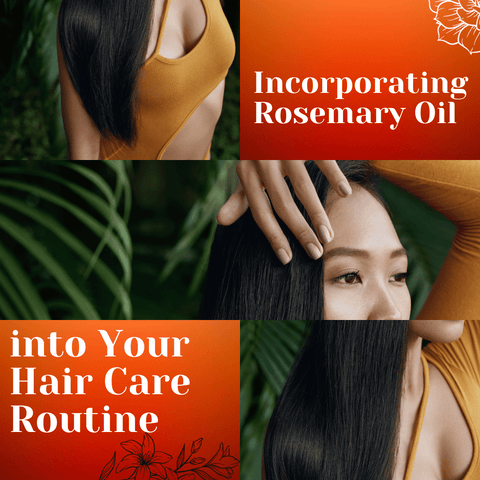
Including rosemary oil in your hair care routine can be a natural and aromatic way to improve the health and appearance of your hair. Here's how to go about it:
-
Select High-Quality Rosemary Oil: Begin by selecting a high-quality, pure rosemary essential oil. Ensure that it is 100% pure and free of any additives or synthetic fragrances.
-
Dilution: Essential oils, such as rosemary, are highly potent and can cause skin irritation if applied directly to the skin. Always dilute rosemary oil with a carrier oil before applying it to your hair and scalp. Coconut oil, jojoba oil, and olive oil are all good carrier oils.
-
Patch Test: Before applying rosemary oil to your scalp and hair, perform a patch test. Check for any allergic reactions or sensitivities by applying a small amount of the diluted oil mixture to a small area of your skin.
-
Massage of the Scalp: Massage a few drops of rosemary oil into your scalp with your preferred carrier oil. Use your fingertips to massage in a circular motion. Scalp massage can boost blood circulation, promoting hair growth and relaxation.
-
Leave-In Treatment: After massaging the oil into your scalp, leave it on for at least 30 minutes, or overnight if time allows. This allows the oil to penetrate the follicles of your hair and nourish your scalp.
-
Shampooing and conditioning: To remove excess oil, wash your hair with a gentle shampoo and conditioner. It is possible that you will need to shampoo twice to remove all of the oil.
-
Regular Use: Use rosemary oil on your hair and scalp on a regular basis to reap the benefits. Many people use it once or twice a week.
-
Rinse your hair: You can add a few drops of rosemary oil to your final hair rinse for a more aromatic experience. This can leave your hair smelling clean and revitalised.
-
Combination with Other Oils: You can also combine rosemary oil with other essential oils known for their hair benefits, such as lavender, cedarwood, or peppermint oil, to create a customised hair treatment.
-
Hair Care in Balance: Keep in mind that your hair's overall health is not solely dependent on external treatments. To support the health of your hair, eat a balanced diet, stay hydrated, and practise good hair care habits.
Before applying rosemary oil to your skin, always perform a patch test to verify you don't have any allergic reactions or skin sensitivities. While rosemary oil may have potential hair and scalp benefits, individual results may vary, and it may not work for everyone. If you have specific hair issues or conditions, seek personalised advice and treatment alternatives from a dermatologist or healthcare professional.
Effective Ways to Use Rosemary Oil for Hair
Rosemary oil is a versatile essential oil that may be used to boost hair health in a variety of ways. Dilution scalp massage, hair and scalp treatment, hair rinse, homemade hair masks, hair oil mix, leave-in conditioner, daily hairbrush treatment, aromatherapy, balancing scalp oil, and consulting a professional are some ways to include rosemary oil into your hair care regimen. Because consistency is crucial, integrate rosemary oil into your hair care routine on a daily basis to gain the advantages. Before using any essential oil, always perform a patch test to rule out allergies or skin sensitivities.
DIY Hair Masks: Rosemary Oil's Role in Nurturing Your Hair
DIY rosemary oil hair masks can be a fantastic way to nurture and improve the health of your hair. Rosemary oil is thought to offer various hair advantages, including boosting scalp health and increasing hair growth. It can provide intense nutrients when used in a hair mask. Here's how to make a rosemary oil hair mask at home:
-
DIY hair mask Ingredients are rosemary oil, carrier oil, honey, egg (optional), and yogurt (optional).
-
Instructions for DIY hair mask are to dilute rosemary oil, add honey and other ingredients, mix well, apply, massage, leave in, rinse and shampoo, condition (optional), and repeat.
Before using any essential oil or new hair treatment, always perform a patch test to rule out allergies or skin sensitivities. If you have any negative effects, stop using it right away. With continued use, you may see improved hair strength, and texture, and maybe increased hair growth.
Rosemary Oil as a Key Ingredient in Your Hair Care
Because of its potential benefits for hair health, rosemary oil is a flexible and important ingredient in hair care. Whether used alone or in combination with other ingredients, rosemary oil can help to maintain and improve the quality of your hair. Here are some methods to use rosemary oil in your hair care routine:
-
Scalp Massage Oil: A few drops of rosemary oil should be mixed with a carrier oil (such as coconut, jojoba, or olive oil). Massage the oil mixture into your scalp gently with your fingertips. Scalp massage with rosemary oil helps improve blood circulation, encourage hair development, and keep the scalp healthy.
-
Hair Growth Serum: Mix rosemary oil with other healthy essential oils such as lavender, cedarwood, or peppermint oil to make a DIY hair growth serum. Apply this serum to your scalp and hair after mixing it with a carrier oil.
-
Shampoo and Conditioner Additive: Add a few drops of rosemary oil to each bottle of your regular shampoo and conditioner. Each application can deliver an aromatic and nutritious experience.
-
Hair Rinse: After shampooing, make a rosemary oil hair rinse by combining a few drops of rosemary oil with a cup of water. As a final rinse, pour the liquid over your hair. It can freshen your hair and possibly increase its gloss and texture.
-
Hair Masks: To make DIY hair masks, combine rosemary oil with additional hair-nourishing substances such as honey, yoghurt, or eggs. These masks can condition and strengthen your hair deeply.
-
Leave-In Conditioner: As a leave-in conditioner, combine a few drops of rosemary oil with water in a spray bottle. Spray it on your hair and scalp throughout the day to maintain moisture and enhance hair health.
-
Hairbrush Treatment: Apply a few drops of rosemary oil to your hairbrush and stroke it through your hair to evenly distribute the oil.
-
Aromatherapy: To experience the stimulating aroma of rosemary essential oil, diffuse it throughout your house. Aromatherapy can help alleviate stress, which benefits hair health indirectly.
-
Balancing Scalp Oil: If you have an oily scalp, combine rosemary oil with a carrier oil and apply sparingly to the scalp to help balance sebum production.
-
Hair Styling Products: Look for hair styling products like hair serums or leave-in conditioners that contain rosemary oil as an ingredient.
To avoid skin sensitivity, always dilute rosemary oil with a carrier oil before using it in your hair care routine. Additionally, before using any essential oil, perform a patch test to check for allergies or skin sensitivities. While rosemary oil is beneficial to many people's hair, individual results may vary, and it may not work for everyone. If you have specific hair issues or conditions, seek personalised advice and treatment alternatives from a dermatologist or healthcare professional.
Tips and Techniques for Optimal Results
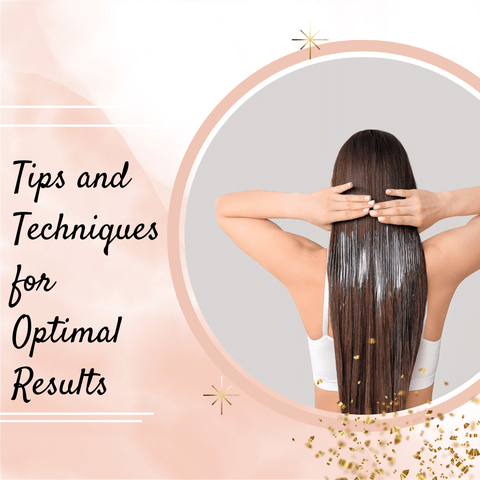
It is critical to use suitable procedures and suggestions when using rosemary oil for hair care to attain the best results. Choose high-quality rosemary oil; dilution is essential; patch test; scalp massage; leave-in treatment; using a shower cap or towel; warming the oil (optional); regular use; a balanced diet; hydration; protecting your hair; trimming regularly; monitoring for allergic reactions; combining with other essential oils (optional); consulting a professional; and being patient. Professional advice may be required if you have underlying hair issues or conditions. Before using any essential oil, always perform a patch test to ensure there is no adverse reaction.
Maximizing the Benefits of Rosemary Oil for Your Hair
Follow these tips and techniques to ensure you are using rosemary oil effectively in your hair care routine to maximise the benefits of rosemary oil for your hair:
-
Use High-Quality Rosemary Oil: Begin with high-quality, pure rosemary essential oil. Choose one that is 100% pure and free of additives or synthetic fragrances.
-
Dilute Properly: Before applying rosemary oil to your hair and scalp, always dilute it with a carrier oil. 2-5 drops of rosemary oil per tablespoon of carrier oil is a common dilution ratio. This minimises skin inflammation.
-
Perform a Patch Test: Before applying rosemary oil to your scalp, perform a patch test on a small area of skin to check for any allergic reactions or sensitivities.
-
Scalp Massage: Massage the diluted rosemary oil into your scalp gently with your fingertips. Circular massage improves blood circulation and promotes hair development.
-
Leave-In Treatment: Allow the oil to sit on your scalp and hair for at least 30 minutes, preferably overnight. To avoid oil from getting to your bedding, cover your hair with a shower cap or towel.
-
Warm the Oil (Optional): Warming the oil slightly before application may aid in its penetration of the hair and scalp. Take care not to overheat the oil.
-
Regular Use: Consistency is essential. Apply rosemary oil to your hair and scalp on a regular basis, such as once or twice a week, to notice the best results over time.
-
Balanced Diet and Hydration: Maintain a healthy diet that is rich in vitamins and minerals that promote hair health. Staying hydrated is also essential for general hair health.
-
Protect Your Hair: Reduce your use of heat styling products, harsh chemicals, and tight hairstyles, all of which can harm your hair. Use heat protectants when employing heat.
-
Regular Trims: Schedule frequent hair trims to remove split ends and preserve your hair's general health and beauty.
-
Monitor for Allergic Reactions: Take note of how rosemary oil affects your scalp and skin. If you suffer from irritation or allergies, stop using it right away.
-
Combine with Other Essential Oils (Optional): Experiment with blending rosemary oil with other essential oils believed to be beneficial to hair, such as lavender, cedarwood, or peppermint oil.
-
Consult a Professional: If you have specific hair issues or conditions, such as hair loss or dandruff, get personalised advice and treatment alternatives from a dermatologist or healthcare professional.
-
Be Patient: It may take several weeks, if not months, to noticeably improve your hair. Maintain your hair care programme with patience and consistency.
Preventing Hair Loss with Rosemary Oil
Rosemary oil is said to have characteristics that might both inhibit and enhance hair growth. While scientific studies into the usefulness of rosemary oil are underway, many people use it as a natural cure for hair loss. Here are some ways rosemary oil may be useful in preventing hair loss:
-
DHT Inhibition: The hormone dihydrotestosterone (DHT) is one of the primary causes of hair loss in both men and women. According to certain research, rosemary oil may help prevent hair loss by inhibiting the synthesis of DHT.
-
Improved Blood Circulation: When massaged into the scalp, rosemary oil is thought to improve blood circulation. Increased blood flow to the hair follicles can deliver more nutrients, potentially promoting hair growth and preventing hair loss.
-
Hair Follicle Stimulation: Rosemary oil is thought to stimulate hair follicles, which can promote hair growth and strengthen existing hair.
-
Antioxidant Properties: Rosemary oil contains antioxidants that can help protect hair follicles from free radical damage. This protection may aid in the prevention of hair loss and the maintenance of overall hair health.
-
Anti-Inflammatory Effects: Scalp inflammation can contribute to hair loss. The anti-inflammatory properties of rosemary oil may help soothe the scalp and create a healthier environment for hair growth.
While rosemary oil is a popular natural cure for hair loss, it's important to keep your expectations in check. The outcome may differ from person to person, and it may not work for everyone. If you have serious hair loss or underlying medical concerns, see a dermatologist or healthcare professional for a thorough evaluation and personalised treatment choices.
Rosemary Oil Infusion: A Nourishing Hair Ritual
A rosemary oil infusion is a nourishing hair ritual that can help improve the health and appearance of your hair. Infusing rosemary oil with dried rosemary leaves can boost its effectiveness and create a customised hair treatment. Here's how to make a rosemary oil infusion and include it in your hair care routine:
-
The hair care routine includes dried rosemary leaves and carrier oil.
-
Prepare the dried rosemary, combine rosemary and carrier oil, seal and store, shake occasionally, strain the oil, and transfer to a glass bottle, according to the hair care routine.
-
How to use rosemary oil infusion on your hair, including scalp massage, hair and scalp treatment, shampoo and conditioner, and regular application
This nourishing hair ritual can help improve hair health, strengthen hair, promote hair growth, and keep your scalp healthy. Rosemary is thought to have numerous hair benefits, and infusing it with oil maximises those benefits. Before using any new hair treatment, always perform a patch test to rule out allergies or skin sensitivities.
Achieving Shiny and Healthy Hair with Rosemary Oil
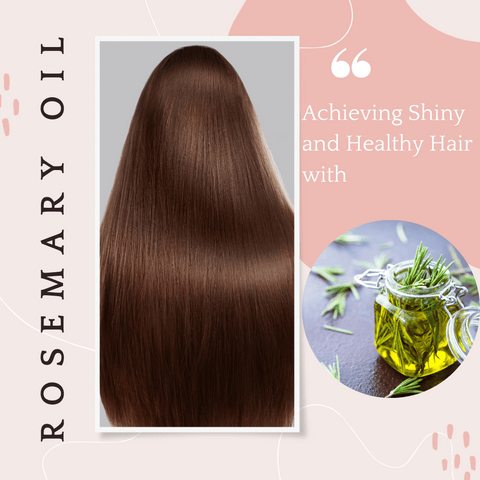
When it comes to lustrous and healthy hair, rosemary oil can be a helpful addition to your hair care routine. Rosemary oil scalp massage, leave-in treatment, shampoo and condition, hair rinse, regular use, balanced diet, hydration, avoiding over-styling and heat, protecting your hair from the sun, trimming regularly, avoiding harsh chemicals, being gentle with wet hair, and consulting a professional are some tips and techniques to help you achieve the desired results. Keep in mind that the effects of rosemary oil on hair might vary from person to person, and it may take some time to see obvious benefits. When it comes to lustrous, healthy hair, consistency and patience are essential.





